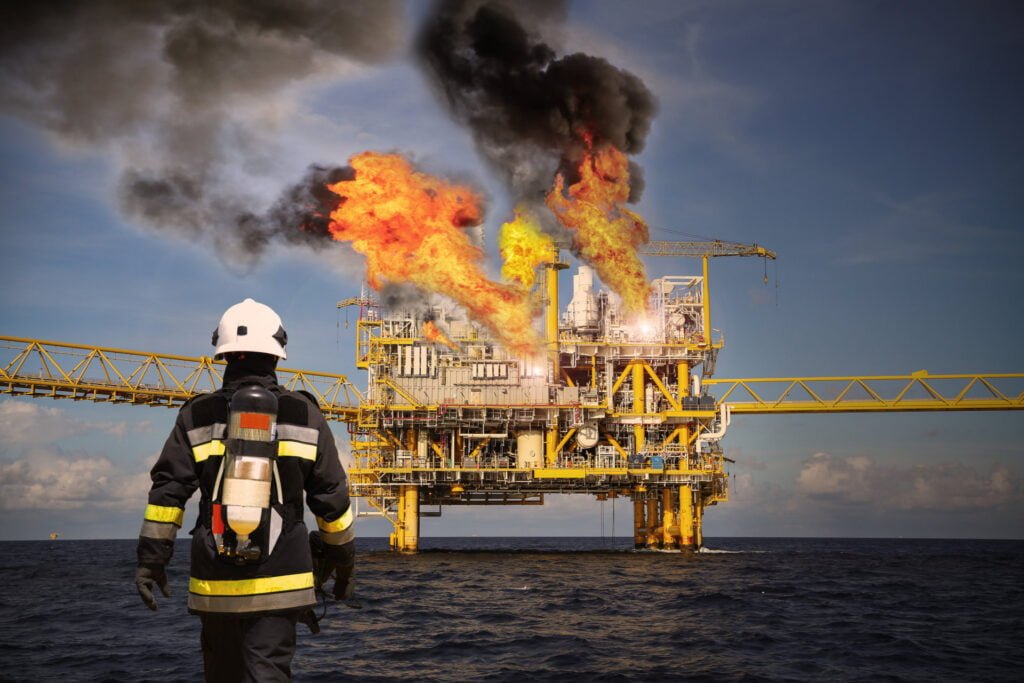Offshore work, whether on oil rigs, platforms, or vessels, is inherently dangerous. Despite stringent safety protocols, accidents can and do happen, often resulting in serious injuries or even fatalities. When such incidents occur, the legal complexities can be overwhelming. This is where an offshore accident lawyer becomes crucial. These legal professionals specialize in navigating the intricate waters of maritime law to ensure that injured workers receive the compensation and justice they deserve.

Understanding Offshore Accidents
Offshore accidents encompass a broad range of incidents that occur on the open water, typically involving workers in industries such as oil and gas, shipping, and fishing. These accidents can be devastating, leading to severe injuries, long-term disabilities, or death.
Definition and Scope of Offshore Accidents
Offshore accidents refer to any mishap that occurs in a marine environment, including but not limited to oil rigs, platforms, vessels, and barges. These accidents often involve hazardous conditions, heavy machinery, and unpredictable weather, making them particularly dangerous.
Common Types of Offshore Accidents
Some of the most common offshore accidents include falls from height, equipment malfunctions, explosions, fires, and collisions between vessels. Additionally, helicopter crashes, which often transport workers to and from offshore sites, are also a significant concern.
Read Also : Houston Maritime Attorney: Your Guide to Navigating Maritime Law
Why You Need an Offshore Accident Lawyer
Navigating the legal aftermath of an offshore accident is not something you should do alone. The laws governing offshore work are complex and differ significantly from those that apply to onshore workers. An offshore accident lawyer brings the expertise and experience needed to protect your rights and maximize your compensation.
Legal Complexities of Offshore Accidents
Maritime law, which governs offshore accidents, is a specialized field that includes the Jones Act, the Longshore and Harbor Workers’ Compensation Act (LHWCA), and various international regulations. Understanding how these laws apply to your case requires a legal professional with specific expertise in this area.
Protecting Your Rights and Interests
An offshore accident lawyer will ensure that your rights are protected throughout the legal process. This includes negotiating with your employer, handling insurance companies, and, if necessary, representing you in court to secure the best possible outcome.
Types of Offshore Accident Cases Handled
Offshore accident lawyers handle a wide variety of cases, each with its own unique challenges and legal considerations.
Maritime Injuries
Maritime injuries are a broad category that includes any harm suffered by workers while performing their duties at sea. This can range from slips and falls to more serious incidents like explosions or equipment failures.
Oil Rig and Platform Accidents
Accidents on oil rigs and platforms are particularly hazardous due to the volatile nature of the work environment. These incidents often involve fires, explosions, and falls, leading to severe injuries or fatalities.
Vessel and Barge Accidents
Vessels and barges are essential to offshore operations, but they also pose significant risks. Collisions, capsizing, and onboard accidents can result in serious injuries or loss of life.
Helicopter Crashes Related to Offshore Operations
Helicopter transportation is a critical component of offshore operations, but it comes with its own set of risks. Crashes can occur due to mechanical failures, poor weather conditions, or pilot error, often resulting in catastrophic injuries.
Read Also : 10 Ways to Reduce Car Insurance Premiums without Sacrificing Coverage
The Jones Act and Its Relevance
The Jones Act is a cornerstone of maritime law, providing essential protections for offshore workers. Understanding this law is crucial for anyone involved in an offshore accident.
Overview of the Jones Act
The Jones Act allows seamen who are injured on the job to sue their employers for negligence. This is a critical piece of legislation for offshore workers, as it provides a means to seek compensation for injuries that occur due to unsafe working conditions.
How the Jones Act Protects Offshore Workers
The Jones Act mandates that employers provide a safe working environment for their employees. If an employer fails to do so, and a worker is injured as a result, the worker can file a claim under the Jones Act to recover damages.
Role of a Lawyer in Jones Act Claims
A lawyer with experience in Jones Act claims can help you navigate the legal process, gather evidence, and build a strong case to ensure that you receive the compensation you deserve.
The Longshore and Harbor Workers’ Compensation Act (LHWCA)
In addition to the Jones Act, the LHWCA provides protections for a different category of maritime workers, such as longshoremen and harbor workers.
Who Is Covered by the LHWCA?
The LHWCA covers workers who are not considered seamen under the Jones Act, such as dock workers, shipbuilders, and other maritime employees who work on or near navigable waters.
Benefits and Protections Under the LHWCA
The LHWCA provides compensation for medical expenses, lost wages, and rehabilitation costs for workers who are injured on the job. This law ensures that maritime workers who are not covered by the Jones Act still receive the support they need after an injury.
Legal Assistance in LHWCA Claims
An offshore accident lawyer can help you file a claim under the LHWCA, ensuring that all necessary documentation is submitted and that you receive the full benefits to which you are entitled.
Steps to Take After an Offshore Accident
If you’re involved in an offshore accident, taking immediate and appropriate action can significantly impact the outcome of your case.
Immediate Actions to Ensure Safety and Health
The first priority after any accident is to ensure your safety and health. Seek immediate medical attention, even if your injuries appear minor, and follow all recommended treatments.
Importance of Reporting and Documentation
Report the accident to your supervisor as soon as possible and ensure that an official incident report is filed. Additionally, document everything related to the accident, including your injuries, medical treatment, and any communications with your employer or insurance companies.
Seeking Legal Counsel
Contact an offshore accident lawyer as soon as possible. The sooner you have legal representation, the better your chances of securing a favorable outcome.
Read Also : How to Negotiate Student Loan Settlement Easily in 2024
Choosing the Right Offshore Accident Lawyer
Selecting the right lawyer to represent you is a critical step in your legal journey.
What to Look for in a Lawyer
Look for an attorney with specific experience in offshore accident cases. This area of law is highly specialized, and you need someone who understands the intricacies of maritime law.
Questions to Ask During Your Consultation
During your initial consultation, ask about the lawyer’s experience with cases similar to yours, their success rate, and their approach to handling claims. This will give you a better understanding of whether they are the right fit for your case.
Evaluating Experience and Track Record
Consider the lawyer’s track record in offshore accident cases. A lawyer with a history of successful outcomes in cases like yours will be better equipped to handle your claim.
The Legal Process in Offshore Accident Cases
Understanding the legal process can help you navigate your case more effectively.
Initial Consultation and Case Evaluation
Your case begins with an initial consultation, during which the lawyer will evaluate the details of your accident and advise you on the best course of action.
Filing a Claim or Lawsuit
If your lawyer determines that you have a valid case, they will help you file a claim or lawsuit against the responsible parties. This may involve negotiating a settlement or preparing for trial.
Settlement Negotiations vs. Going to Trial
Many offshore accident cases are resolved through settlement negotiations. However, if a fair settlement cannot be reached, your lawyer may recommend taking the case to trial.
How an Offshore Accident Lawyer Builds Your Case
Building a strong case requires a thorough understanding of the legal landscape and meticulous attention to detail.
Gathering Evidence and Expert Testimony
Your lawyer will gather all necessary evidence, including accident reports, medical records, and expert testimony, to support your claim.
Understanding Maritime Laws and Regulations
A deep understanding of maritime laws and regulations is essential to building a successful case. Your lawyer will apply their knowledge of these laws to your specific situation.
Negotiating with Employers and Insurance Companies
Your lawyer will handle all negotiations with your employer and their insurance company, ensuring that your rights are protected and that you receive a fair settlement.
Challenges in Offshore Accident Cases
Offshore accident cases present unique challenges that require specialized legal expertise.
Jurisdictional Issues in Offshore Cases
Determining the proper jurisdiction for your case can be complicated, especially if the accident occurred in international waters. Your lawyer will help navigate these jurisdictional challenges.
Statute of Limitations and Time Constraints
Offshore accident claims are subject to strict time limits, known as statutes of limitations. It’s crucial to act quickly to ensure that your claim is filed within the required timeframe.
Complexity of Maritime and Offshore Laws
The complexity of maritime and offshore laws can make these cases difficult to navigate. An experienced lawyer will help you understand these laws and how they apply to your case.
The Cost of Hiring an Offshore Accident Lawyer
One of the most common concerns for injured workers is the cost of hiring a lawyer. Fortunately, many offshore accident lawyers work on a contingency fee basis.
Understanding Contingency Fees and Legal Costs
A contingency fee arrangement means that you don’t pay any legal fees unless your lawyer wins your case. This can provide peace of mind and reduce the financial burden of pursuing legal action.
How Contingency Fee Arrangements Work
Under a contingency fee arrangement, your lawyer’s fee is a percentage of the settlement or judgment you receive. This means that your lawyer is motivated to achieve the best possible outcome for your case.
Is Hiring a Lawyer Worth the Investment?
Given the complexities of offshore accident cases and the potential for significant compensation, hiring a lawyer is often well worth the investment. A skilled lawyer can increase your chances of success and help you secure the compensation you deserve.
Real-Life Case Studies
Examining real-life cases can provide valuable insights into how offshore accident claims are handled.
Successful Jones Act Claims
There have been numerous successful Jones Act claims where injured workers received substantial compensation for their injuries. These cases highlight the importance of having skilled legal representation.
Resolving Offshore Injury Disputes
Offshore injury disputes can be resolved through negotiation, mediation, or trial. Each approach has its own advantages, and your lawyer will recommend the best strategy for your case.
Environmental Litigation in Offshore Accidents
Some offshore accidents result in environmental damage, leading to complex litigation involving multiple parties. An experienced lawyer can navigate these challenging cases and protect your interests.
The Future of Offshore Accident Law
The field of offshore accident law is constantly evolving, with new trends and technologies shaping the landscape.
Emerging Trends in Offshore Safety Regulations
As safety regulations continue to evolve, it’s important for offshore workers to stay informed about the latest developments. These regulations can have a significant impact on your rights and protections.
The Impact of Technology on Offshore Accident Cases
Technology is playing an increasingly important role in offshore accident cases. From advanced safety equipment to sophisticated accident reconstruction tools, technology is helping lawyers build stronger cases.
The Evolving Role of Offshore Lawyers
The role of offshore lawyers is also evolving, with an increasing focus on protecting workers’ rights in an ever-changing legal environment. Staying ahead of these changes is crucial for successful legal representation.
Conclusion
Offshore work is inherently dangerous, but injured workers don’t have to navigate the legal aftermath alone. An experienced offshore accident lawyer can help you understand your rights, build a strong case, and secure the compensation you deserve. Whether you’re dealing with a Jones Act claim, an LHWCA case, or another type of offshore injury, having the right legal representation can make all the difference.
FAQs
Seek medical attention immediately, report the accident to your supervisor, and document everything related to the incident.
The timeframe varies depending on the type of claim and jurisdiction, but it’s generally advisable to act quickly to ensure your rights are protected.
The Jones Act covers seamen, while the LHWCA provides protections for other maritime workers such as longshoremen and harbor workers.
Under the Jones Act, seamen can sue their employers for negligence if unsafe working conditions led to their injury.
A lawyer can provide expert legal advice, gather evidence, negotiate with employers and insurance companies, and represent you in court if necessary.



